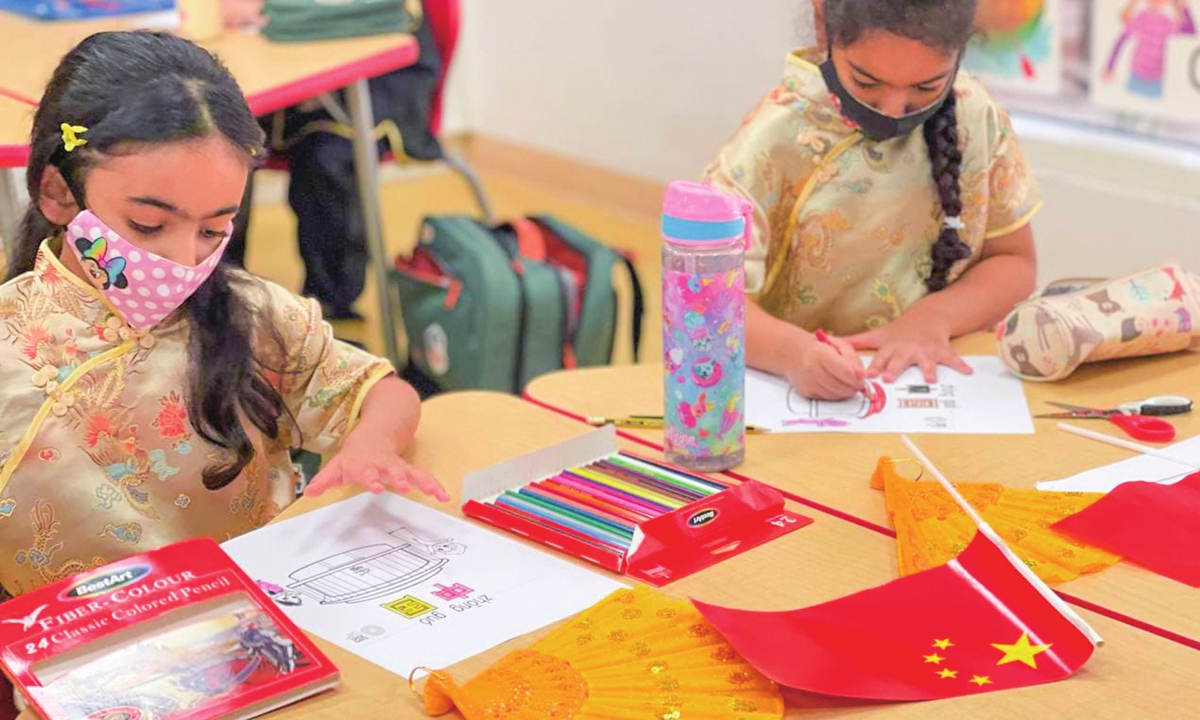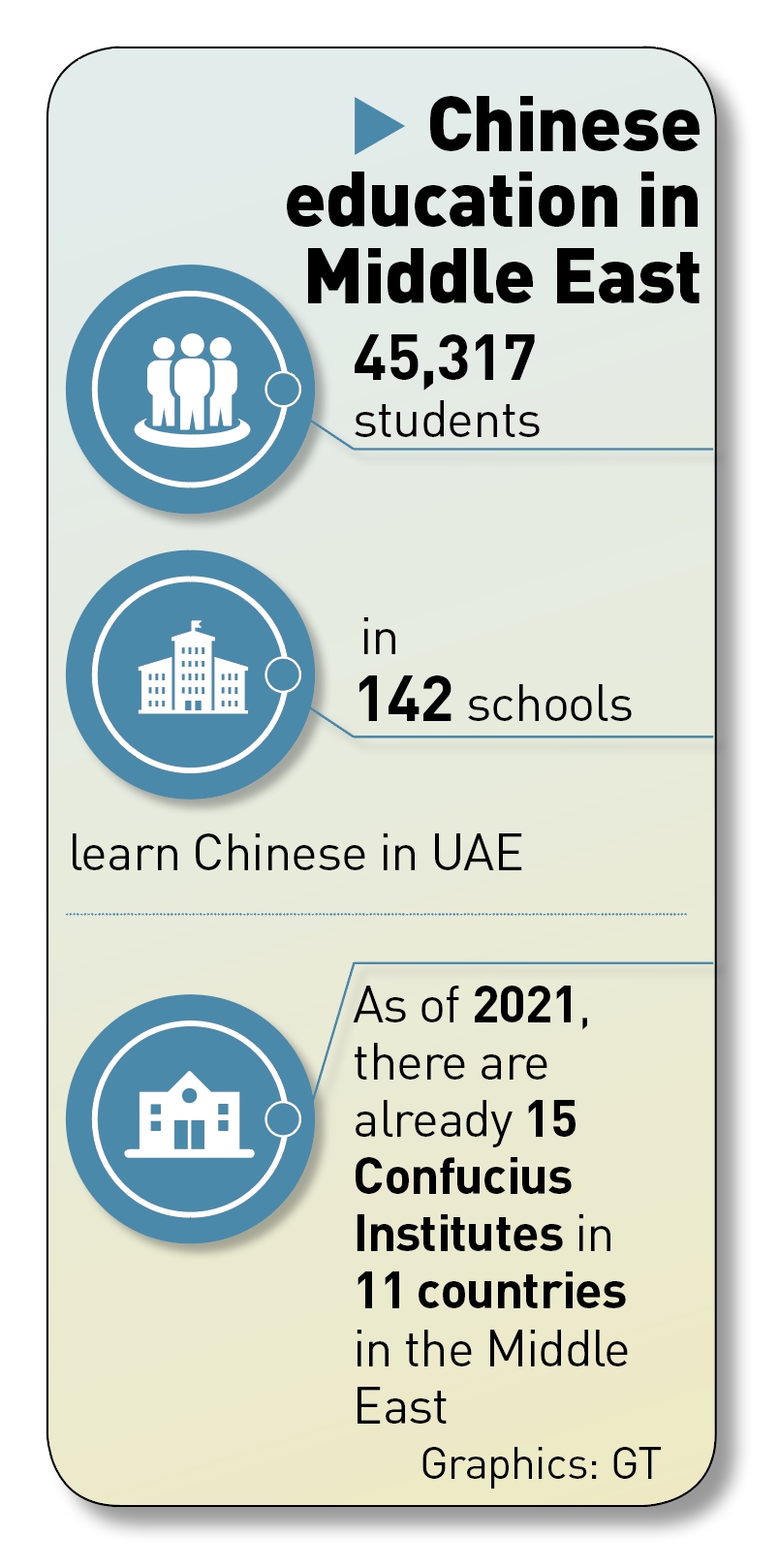Since Hamdan Bin Zayed School started a Chinese language course in 2006, Chinese-language education has taken root across the United Arab Emirates (UAE) where the number of students nationwide learning Chinese has increased from merely 20 to more than 45,000 with a systematic learning project. Behind this is the country’s prerequisite to seek development and innovation and deepened cooperation with China.
“Our students have developed a deep level of understanding, love and respect for the Chinese culture,” Fatma Ahmed Al Bastaki, Cluster Manager and Chinese Project Manager of the UAE, told the Global Times as she spoke of her students at Hamdan Bin Zayed School.
Only 20 students signed up for the Chinese course at first. Yet from the humble beginning, there are now 142 schools in the UAE offering Chinese language classes, covering 45,317 students, with over 180 Chinese teachers. In 2019 alone, 60 public schools launched Chinese language courses in the country, from kindergarten to high school, as part of the UAE’s national education system.
This massive growth is inseparable from the fact that the UAE made itself the first Arab country to incorporate Chinese language learning into its national education plan, from kindergarten all the way through to high school.
As the UAE is a hub in the Middle East that exports modern Arab culture, the attraction of Chinese-language education in the UAE will spread among the elites in the Arab world, thus further promoting the trend and increasing understanding and communication between China and the Arab countries, analysts said.
Boost in cooperation
In 2019, the Ministry of Education of the UAE stated that it would promote Chinese language teaching into a total of 200 public schools before 2030.
The project was first brought up in 2018 when Chinese President Xi Jinping met with Sheikh Mohammed bin Zayed Al Nahyan, crown prince of Abu Dhabi of the UAE.
“The project is going well so far,” Ni Jian, Chinese ambassador to the UAE, told the Global Times on Monday, indicating that judging from the enthusiasm of young people in the UAE for studying Chinese, this plan will be “implemented smoothly and will reach the goal in advance.”
Some in the UAE believe that Chinese will become the third-largest language system in the country, after Arabic and English.

Students learn Chinese at Hamdan Bin Zayed School in Abu Dhabi of the UAE. Photo: Courtesy of Hamdan Bin Zayed School
And this expectation is not baseless.
The UAE is China’s largest investment destination in the Arab world and a model of economic and trade cooperation under the Belt and Road Initiative (BRI), and China is also the UAE’s second-largest trading partner. There are currently about 6,000 Chinese companies doing business in the UAE.
“The two countries have extensive cooperation in fields such as culture, education, science and technology and even traditional Chinese medicine (TCM), which have become highlights of cooperation under the BRI,” the ambassador told the Global Times, showing how indispensable the Chinese language teaching system is.
Hub radiation
Experts believe that the systematic Chinese learning is a basic strategy for the UAE to strengthen cooperation with China while seeking development and innovation.
Not long after the UAE formally established diplomatic relations with Israel in August 2020, the UAE sent its first official delegation to Turkey in 2021, bringing to an end their almost 10-year frozen ties. In early December, Iran also expressed willingness to develop relations with the UAE.
In the past few years, the UAE has been adapting to a balanced and safe development model of its own, and is intending to strengthen relations with China as well, an important partner, in all aspects including language education, Li Guofu, a research fellow at the China Institute of International Studies, told the Global Times.
“By aiming at our innovative industry, the UAE has clearly realized the importance of cultivating Chinese language and culture talent to further smooth communication and cooperation,”

GT
The UAE is one of the transportation hubs connecting three continents and an important economic center in the Middle East, and its increasingly mature Chinese teaching program is radiating out to other Arab countries.
In Saudi Arabia, the University of Jeddah listed learning Chinese as a compulsory course for preparatory students since October, where local media described it as “a new era of Chinese language in Saudi Arabia.”
As of 2021, there are already 15 Confucius Institutes in 11 countries in the Middle East including Jordan, Turkey and Saudi Arabia.
In Lebanon, ever since the Confucius Institute at the University of Saint Joseph (USJ) was established in 2006, the first in the Arab world, over 4,000 students have been trained in Chinese language learning, said the Xinhua News Agency.
“In the past, Lebanese students used to register for the Chinese language as an elective course. Today, we receive students from the USJ and other universities who aim to learn the Chinese language to either work in China or continue their education in the East Asian country,” Antoine Hokayem, director of the Confucius Institute in USJ, said on the occasion of the 15th anniversary of the institute.
Students who learn Chinese pose with a Chinese national flag and their paintings at Hamdan Bin Zayed School in Abu Dhabi of the UAE. Photo: Courtesy of Hamdan Bin Zayed School


